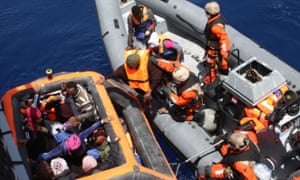PBS: Escaping Eritrea … [Read More...] about ካብ ውሽጢ ቤት ማእሰርታት ኤርትራ

The EU’s executive body is to unveil radical new proposals on immigration, imposing migrant quotas on the 28 countries of the union under a distribution “key” system set by Brussels. The plan, which is supported by Germany and will be fiercely resisted by the new Conservative government, will be launched by theEuropean commission on Wednesday in response to migrant boat crisis in the Mediterranean.
The bold move by Brussels comes as the EU draws up plans for military attacks inLibya to try to curb the flow of people across the Mediterranean by targeting the trafficking networks. The EU’s top diplomat is to unveil an attempt on Monday to secure a UN mandate for armed action in Libya’s territorial waters. Britain is drafting the UN security council resolution that would authorise the mission, senior officials in Brussels said. It would come under Italian command, have the participation of about 10 EU countries – including Britain, France, Spain and Italy – and could also drag in Nato, although there are no plans for the initial involvement of the alliance.
While there is broad support within the EU for the military plans, the proposals for sharing the immigration burden are highly controversial and divisive. On Sunday night the Home Office said the plans were unacceptable to the UK, putting Cameron on a collision course with German chancellor Angela Merkel and other EU leaders as he begins attempts to renegotiate Britain’s relationship with Brussels ahead of a promised in/out referendum in 2017.
“The UK has a proud history of offering asylum to those who need it most, but we do not believe that a mandatory system of resettlement is the answer. We will oppose any EU commission proposals to introduce a non-voluntary quota,” a spokesman said. The policy document, obtained by the Guardian, demands new and binding rules establishing a quota system of sharing refugees among the member states. The migration agenda declares: “The EU needs a permanent system for sharing the responsibility for large numbers of refugees and asylum seekers among member states.” By the end of the year, Brussels is to table new legislation “for a mandatory and automatically triggered relocation system to distribute those in clear need of international protection within the EU when a mass influx emerges”.
The proposals will lay bare deep divisions between national governments over immigration, with the German chancellor, Angela Merkel, backing the scheme and Britain leading the resistance. Germany and Sweden between them take almost half the asylum seekers in the EU, and Berlin is predicting that the numbers this year could almost double to about 400,000 in Germany, two-thirds of the total number in the EU last year.
The commission paper says: “Some member states have already made a major contribution to [refugee] resettlement efforts. But others offer nothing.” It also insists that Europe has to open up legal avenues for migrants to enter the EU safely, a notion that is strongly opposed by Theresa May, the home secretary. “Such vulnerable people cannot be left to resort to the criminal networks of smugglers and traffickers. There must be safe and legal ways for them to reach the EU,” the document says. Hungary’s prime minister, Viktor Orbán, a leading hardliner on immigration, described the commission proposals as mad and pledged to defy Brussels. He said: “The European concept of ‘someone letting immigrants into their country’ and then ‘distributing’ them among the other member states is a mad and unfair idea.”
Brussels is proposing to invoke emergency mechanisms by the end of the month that will oblige the 28 countries to share the numbers of “persons in clear need of international protection” and “to ensure a fair and balanced participation of all member states to this common effort. This step will be the precursor of a lasting solution”. The blueprint, to be unveiled by Dimitris Avramopoulos, the EU commissioner for migration, home affairs and citizenship, includes a distribution key system based on various criteria, from national wealth levels to unemployment rates, to determine what proportion of refugees each of the 28 countries should admit.
